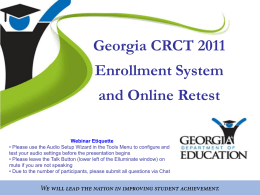Georgia Crct Score Interpretation Guide

The month-long slog of standardized testing starts next week in the Muscogee County School District. This is the second year of the state’s most recent accountability exams for public school students in grades 3-12, the Georgia Milestones Assessment System. It replaced the Criterion-Referenced Competency Tests, which Georgia used for 15 years. The Georgia Milestones tests are considered tougher than the CRCT. They are based on a more rigorous curriculum, and they include questions that push students beyond simple multiple choice. They require “constructed responses,” meaning students must provide the correct answer instead of selecting it, or they might have to explain how they got the answer or even explain why a provided answer is wrong. These tests matter because they are used to determine whether students in certain grades are promoted or retained and because they are part of the formula that produces the College and Career Ready Performance Index, the state’s rating system for its public schools.

Last year, the Georgia Milestones results weren’t released until the fall, so the Georgia Department of Education waived those requirements for advancement. If students in grades 3, 5 and 8 fail those tests this year, they will be allowed to retake the required sections. If they still don’t pass, their parents or guardians may file an appeal with the school’s promotion and retention committee. For high school students, the Georgia Milestones tests matter because they count as 20 percent of their final grade in that course. With all that at stake, Patrick Knopf, the school district’s director of research, accountability and assessment, offered the following perspective: “The tests are important for school and district accountability, but it is important to remember they are one snapshot of what our students can do,” he told the Ledger-Enquirer in an email.
Georgia Crct Prep Book

Georgia Crct Practice Test
“Teachers and students have been working hard all year and should go into the test confident in the work we have been doing.”. By In fact, educators say, the Georgia Milestones aren’t the type of exams students can study for with a cram session the night before the tests. The best way to succeed on them, they say, is to pay attention in those classes and study those subjects throughout the school year as the teachers cover the state standards.
“Our teachers have been working hard to give students multiple opportunities to work through the types of tasks and constructed responses they will see on the Georgia Milestones,” Knopf said. Knopf also suggests. ▪ “Students should be reading every day. Help students by talking about what they have read. Guide them in discussing the main idea of what they read and how that may be similar or different from something else they have previously read.” ▪ “Students should practice writing responses to things they have read. Be sure they write complete sentences and include details about what they have read.” ▪ “Take advantage of any extra help offered at school.
Many schools offer before- or after-school tutoring to help students with areas of need at a pace slower than that of the regular school day.” Here are additional tips from Knopf to implement during the Georgia Milestones testing period: ▪ “Encourage students to continue to work even when they are stuck. Many times, students will get partial credit, particularly in math, for attempting to answer a question. This is a good habit to develop in preparing for the test, but more importantly, for dealing with everyday challenges students may face in life.” ▪ “The first day of testing is not the time to change up the morning routine.
Have a routine and stick to it.” The state’s education department has mandated that, by the 2018-19 school year, all of its standardized tests must be taken online, except for special-education students whose Individualized Education Plan requires a different accommodation. Last year in Muscogee County, grades 5 and 8 took the Georgia Milestones online; grades 4 and 6 will join them this year. The number of questions in the tests and the time students are allowed to take them vary by subject. The questions range from approximately 30 to 60 items and the time ranges from 60 to 90 minutes with breaks between sections, Knopf said.